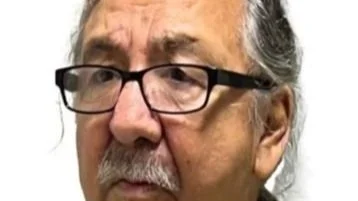Leonard Peltier: Life behind bars is ‘miserable’ but he has not given up hope of being free some day. Part 5
Part 5 and end of series.
Leonard Peltier said his life behind bars is more difficult with each passing year.
“My life has become more miserable than it has been for the last 47 years,” he said.
Peltier (seen above in a submitted photo) said he is plagued by numerous ailments. He has an aortic aneurysm as well as diabetes and prostate cancer, and is blind in one eye after suffering a partial stroke. Peltier said he often uses a walker to get around and no longer is able to enjoy the sports and activities that provided relief from the tedium of prison life.
“I didn’t want to do 47 years in prison. Who the hell does?” he said. “I should have been out 30 years ago, 40 years ago. Hell, I should never have been in prison.”
Peltier called me from a prison counselor’s office. It took two months to arrange the 95-minute conversation, with the reporter required to fill out several pieces of paperwork to have the interview approved.
Peltier called after eating his breakfast. He rises at 6:30 a.m. from a cell he shares with another man. They are not friends and Peltier is not thrilled with his current cellmate, he said.
“My life has become more miserable than it has been for 47 years,” he said.
He gets an insulin shot and then heads to the mess hall for his morning meal. Peltier said he then goes to a common area and makes himself a cup of coffee, checks his email and sometimes reads.
“I’m pretty well-read,” he said.
He can go outside for a couple hours, but at his advanced age and with his physical limitations, he no longer plays handball or runs to stay in shape.
“I’m not the athlete I used to be,” Peltier said.
He used to paint a lot, and has sold some of his work. But he said a painful shoulder has ended his ability to paint for now. He requested a wheelchair, he said, but that was turned down.
Peltier said he spends most of his free time talking with other inmates, primarily the other 15-20 Native Americans in the prison. It’s a drab existence, but conditions are better than during the height of the COVID-19 pandemic, he said.
Inmates were locked down 24 hours a day for two years, Peltier said. There was no recreation, and they were only allowed to shower every three days. Meals usually consisted of peanut butter and bologna sandwiches.
“Well, it was pretty rough,” Peltier said. “Prison is supposed to be about rehabilitation, not punishment.”
He sees some of the same faces return time and again. Most inmates who end up back in prison are addicted to drugs and/or alcohol, he said. Inmates who were educated and learned trades didn’t come back, Peltier said.
But he said it’s outrageous that some people are sentenced to 30 years for a couple ounces of marijuana.
“American people need to understand what’s going on,” Peltier said. “We’re living under a police state.”
Peltier said he has never been involved with drugs or alcohol
“I try to keep clean,” he said. “I’m about our people and what happened to us.”
Peltier said he is aware other groups of people have faced mistreatment and slaughter, including Africans brought to America as slaves, and Jews who were murdered by Adolf Hitler’s Nazi regime. But he said Native Americans were killed and forced from their land for centuries.
“They killed us by the millions,” Peltier said.
On Aug. 1, 1953, House Concurrent Resolution 108, which called for the immediate termination of the Flathead, Klamath, Menominee, Potawatomi, and Turtle Mountain Chippewa, as well as all tribes in the states of California, New York, Florida, and Texas, was passed by Congress.
It meant the immediate withdrawal of all federal aid, services, and protection, as well as the end of reservations. However, it was never enacted, and in 1964, the Turtle Mountain Chippewa were removed from the list.
Peltier was just 9 at the time, but he said his family was very aware of the political machinations.
“My father and his generation resisted,” he said. “When I was 13, I started to get involved. In school, we learned we were a bunch of savages. Grandpa would say, ‘That’s bullshit, that’s pure bullshit.’ We had a culture here. Most people here were farmers. That’s what we were, we’re farmers.”
His family’s involvement in Native American struggles goes all the way back to 1862 and the bloody Dakota War in western Minnesota. Mdewakanton Dakota Chief White Dog, one of 38 warriors hanged in Mankato, Minn., on Dec. 26, 1862, was a great-great uncle, Peltier said.
“Why is it always a crime when the Native people fight back? They were trying to exterminate us!” he said. “I’m saying, goddamn, we had a right to survive”
This is all a continuation of persecution and the attempted extermination of his people, in Peltier’s view. But he is weary of fighting.
“I’m not a violent person,” Peltier said.
He wants to alleviate his many medical problems if he is released, including prostate problems, an aneurysm in his heart, painful feet and shoulders.
“I would get medical treatment first,” Peltier said. “Because they’re all treatable.”
He wants to return to his homeland, and he has been offered a house by the Turtle Mountain Chippewa tribe. He would spend time with family — he is divorced but has seven children, and several grandchildren.
“I’d love to see them,” Peltier said. “See family … go to the pow-wows, talking with the elders. Of course, I’m an elder now.”
He has been painting for years and sells some of his artwork through a granddaughter.
“I think I could do well with my artwork,” Peltier said. “I’ve been doing art since I was a little kid. Remember, we had to create our own toys. When I went to school in kindergarten, I started getting A’s in a handwriting course. They were shocked I could do such clear handwriting. I really got into it when I got to prison.”
He still has plans, and dreams.
“I’m not going to give up. I’m going to fight with my last breath,” Peltier said. “No country should be able to do that to anyone.”
Tom Lawrence has written for several newspapers and websites in South Dakota and other states and contributed to The New York Times, NPR, The Telegraph, The Daily Beast and other media outlets.







